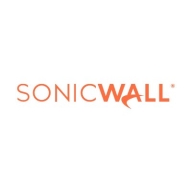


SonicWall TZ and SonicWall NSv are competitors in the firewall security market. TZ holds an edge in user-friendliness and suitability for small businesses, while NSv shines with its advanced security capabilities.
Features: SonicWall TZ is noted for its ease of use, site-to-site VPN, and content filtering. NSv is recognized for advanced network threat protection, application control, and robust deployment abilities.
Room for Improvement: SonicWall TZ could improve its interface intuitiveness and reporting tools. NSv would benefit from better upgrade paths and export/import functionalities. Both products require enhanced support services for increased user satisfaction.
Ease of Deployment and Customer Service: SonicWall TZ is adaptable to on-premises and hybrid deployments, experiencing mixed customer support quality. NSv is effective in both on-premises and cloud environments, with knowledgeable but sometimes slow technical support.
Pricing and ROI: SonicWall TZ and NSv both offer solid ROI through improved network security and productivity. TZ is competitively priced, though additional licenses can be costly. NSv, priced higher than some competitors, includes Global VPN charges as extra expenses.
Clients are now comfortable and not wasting productive hours on IT support.
The automation part is giving us a cost benefit and speed; we can react faster.
It's a very useful tool to mitigate and protect your enterprise.
Investment was challenging but strategic, given its advantages like 30% depreciation in the Indian ecosystem by the third year.
I have seen a return on investment that includes money saved, time saved, and fewer employees needed.
Based on SonicWall NSv, it helped us to easily navigate through everything and get done what we needed in a very quick manner.
That is a reason to buy a firewall, and it is challenging to put a monetary value on security.
The quick resolution of issues with Fortinet FortiGate is due to the support of the company and the fact that the equipment is easy to work with.
I would rate the technical support for Fortinet FortiGate a ten out of ten.
As a solution provider, when I encounter problems, I connect directly with Fortinet support, and they provide solutions within a very short time.
Customer support for SonicWall NSv is top-notch.
Whenever I create a case regarding any issue, their support is prompt and effective, adhering to the SLA, which leaves our customers very satisfied.
I would rate the customer support a 10 out of 10.
Customer service is excellent.
For support, I would rate SonicWall TZ five out of 10.
They scale up really well from smaller models like the FortiGate 40 and 50 to bigger sites with the FortiGate 100 for more throughput - up to enterprise datacenters.
The variation comes in terms of the interfaces and throughputs, but from a security perspective, you get the same benefit, irrespective of whether you have an entry-level unit or an enterprise.
We determine sizing based on multiple factors: number of users, available links, traffic types, server count, services in use, and whether services will be published.
It has met our organization's needs by allowing us to scale our security posture consistently with our cloud compute growth, increased traffic and user areas, new cloud regions, and policy complexity growth.
Nonetheless, the product is robust, eliminating major scalability concerns.
On a scale from 1 to 10, I would rate its scalability as eight to nine.
We're experiencing 99.999% availability consistently.
I would rate the stability of Fortinet FortiGate a ten out of ten.
Currently, we are experiencing a general outage of one of the main internet service providers of the Dominican Republic, and we have not been impacted in our operations because with SD-WAN, we have another internet service provider and we are working with the second WAN connection without any disruption.
Understanding and handling these devices onsite was limited, requiring external support.
It rates around eight to nine in terms of stability, and it is quite good.
Regarding security, we have not had any issues since we have been using SonicWall NSv, and everything is usually up to date.
In terms of stability, SonicWall doesn't have performance issues.
SonicWall TZ rates 10 out of 10 for stability.
SonicWall TZ is definitely stable and offers a good value for money.
When considering Sophos XG, which we also use, the logging and reporting functionality is notably more efficient.
These sessions should be around five to ten minutes long, allowing users and partners to quickly grasp the information without disrupting their daily tasks.
The solution should be able to implement machine learning and analytics of all the logs for threat detection and protection.
I believe that application-based QoS policy is very important given the current environment. This feature should be available for application QoS as well in this firewall.
When the software was downloaded, optimal hardware utilization was lacking, making hardware upgrades inevitable.
Currently, we are getting challenges with user-wise reports and other reporting details.
Integration with other vendors, especially with VPNs, can be challenging and requires more effort when configuring.
SonicWall TZ could benefit from newer technology.
The VPN license should be improved by providing more free SSL VPN licenses.
Last year, I renewed the support for three years, which can sometimes be expensive but depends on the security benefits and how it helps us.
It offers cost savings as it is generally cheaper than the competition.
It is about 20% cheaper.
The Global VPN will be chargeable in our product, unlike Fortinet or Sophos, where it is free—this is a major difference.
SonicWall NSv was a bit expensive for the subscription.
My experience with pricing, setup cost, and licensing has been that it is low cost.
More licenses are required to purchase the perpetual license for SSL VPN and Global VPN.
When comparing similar products across vendors, there may be a small difference in cost.
I would also position its pricing as a three, where one is the lowest price and ten is the highest.
These features help reduce our downtime, manage the ISPs, and deploy SLAs for all the website traffic.
The most valuable feature of FortiGate is FortiView which provides proactive monitoring.
We got a firewall and gave an SSL VPN to my client to connect to their servers, after which, such kind of activities involving ransomware attacks stopped.
The cloud delivery threat intelligence spots suspicious behavior in just a few seconds, stopping it before execution, automatically blocking and quarantining files.
SonicWall NSv positively impacts my organization by providing firewall capabilities as a virtual firewall while offering the capabilities of a physical firewall with great performance and reliability.
SonicWall NSv has positively impacted my organization by helping us access our whitelisted web apps since we manage web apps while ensuring proper standards to prevent any information leaks.
For SMB segments, SonicWall performs well.
It was beneficial during COVID for remote work through its VPN functionality.
The advanced gateway security features such as web filter, application control filter, IPS, ideas, gateway antivirus, anti-spyware, and botnet filter are valuable.
| Product | Market Share (%) |
|---|---|
| Fortinet FortiGate | 18.7% |
| SonicWall NSv | 0.3% |
| SonicWall TZ | 2.4% |
| Other | 78.6% |


| Company Size | Count |
|---|---|
| Small Business | 357 |
| Midsize Enterprise | 133 |
| Large Enterprise | 188 |
| Company Size | Count |
|---|---|
| Small Business | 10 |
| Midsize Enterprise | 8 |
| Large Enterprise | 7 |
| Company Size | Count |
|---|---|
| Small Business | 62 |
| Midsize Enterprise | 16 |
| Large Enterprise | 13 |
Fortinet FortiGate is a versatile network security tool offering features like VPN, firewall, web filtering, intrusion prevention, and scalability. It is known for its performance and integration with other Fortinet products, making it a preferred choice for robust cybersecurity.
Fortinet FortiGate stands out as a comprehensive cybersecurity solution with strong performance and ease of configuration. It delivers unified threat management, integrating features such as dynamic routing, SD-WAN support, and centralized management. Despite its strengths, improvements in the web interface's stability, pricing structures, and reporting capabilities are needed. Users seek better integration with third-party tools and automation advancements to enhance the experience further. These enhancements, alongside improvements in bandwidth management and the reduction of licensing costs, are points of interest for users looking to capitalize on FortiGate's extensive capabilities.
What are Fortinet FortiGate's key features?Fortinet FortiGate is widely implemented across industries as a primary firewall system for securing internet gateways and safeguarding data centers. It supports businesses in achieving SD-WAN integration and enhances cybersecurity by providing essential features like antivirus, web filtering, and application control. Enterprises utilize FortiGate for securing remote connections and ensuring compliance with security standards, making it adaptable for different network sizes and industries.
SonicWall NSV is a software-based virtual firewall that provides additional security for customers with public-facing servers or services on Microsoft Azure. The AGSS Bundle is considered the most valuable feature, providing security services such as antivirus, intrusion prevention system, and anti-spyware botnet GUI.
Additionally, customization of firewall rules provides great value to customers, allowing them to lock things up in the way they desire. SonicWall NSV offers extensive security control options to protect customers' valuable information and assets.
We monitor all Firewalls reviews to prevent fraudulent reviews and keep review quality high. We do not post reviews by company employees or direct competitors. We validate each review for authenticity via cross-reference with LinkedIn, and personal follow-up with the reviewer when necessary.